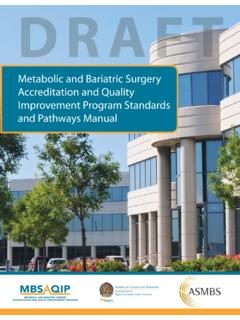Transcription of American Society for Metabolic Bariatric Surgery
1 100 SW 75th Street | Suite 201 | Gainesville, FL 32607 | Ph: | Fx: | | Society for Metabolic & Bariatric Surgery February 22, 2013 Centers for Medicare & Medicaid Services (CMS) National Coverage Analysis (NCA) Regarding certification for Surgery for the Treatment of Morbid Obesity (CAG-0025OR3) The role of the Integrated Health team approach in the care of the Bariatric surgical patient was officially recognized in the 1991 NIH Consensus Development Statement and reemphasized in 2000 by both the ACS and ASBS/SAGES recommendations for Bariatric Surgery practice. Building on this momentum, accreditation programs were developed by both the American Society of Metabolic and Bariatric Surgery (ASMBS) and American College of Surgery (ACS) which further ensured that all aspects of the multidisciplinary team were implemented to create a well-trained, safe and effective environment for the complex medical patient in the ongoing clinical pathway of Bariatric Surgery .
2 Respectfully, the leadership and majority representation of the Integrated Health Section of the ASMBS strongly reject the assumption that the safety profiles of non-BSCOE programs would have developed in the absence of the influence of the BSCOE standards. Clearly, the BSCOE standards have been the leading impetus for the research, dissemination of knowledge, mentorship, and coordinated trainings that have enhanced the safety of Bariatric surgeries. Further, we believe there to be little doubt that rescinding the need to meet these standards would significantly jeopardize the availability of integrated Bariatric healthcare services to patients, thereby disregarding the mounting evidence demonstrating the importance of multidisciplinary resources for insuring best patient outcomes and cost effectiveness. Following is a concise summary of empirical evidence supporting our position.
3 Prior to and across the continuum of Bariatric Surgery , patients undergo assessment, treatment and education from the multidisciplinary team of Integrated Health professionals including but not limited to nurses, dietitians, behavioral health specialists, exercise specialists and obesity medicine physicians. Perioperative nursing care following Bariatric and Metabolic Surgery entails diligent, prudent, and specific assessment skills. The numerous co morbidities associated with severe obesity significantly increase the risk for postoperative complications. The nurse must possess in-depth knowledge of potential complications and the training and experience to quickly recognize and effectively manage these complications. Often, the signs and symptoms of emergent complications can be quite subtle, yet even brief delays in astute assessment and intervention may well lead to the demise of the Bariatric surgical patient.
4 The importance of the diverse roles fulfilled by specialized nurses in achieving a comprehensive continuum of care was recognized in 2007 when the ASMBS initiated the Bariatric Nurse Certification. To date there are over 1100 certified Bariatric nurses. The role of the specialized registered dietitian is invaluable. Performing a comprehensive nutritional assessment to determine a nutrition diagnosis and implementing a nutrition intervention using evidence-based nutrition guidelines is an important correlate with patient success. All patients undergoing Bariatric and Metabolic Surgery are at risk of vitamin and mineral deficiencies, as well as possible macronutrient deficiencies. Therefore, monitoring and evaluating an individual s progress over subsequent visits with the registered dietitian is important to help prevent Surgery specific vitamin and mineral deficiencies.
5 Behavioral health specialists fulfill a critical role in promoting successful Bariatric Surgery outcomes. Preceding Surgery , psychosocial evaluation is utilized as a specialist consultation in the patient selection and education process with the aim of identifying potentially relevant psychosocial factors and formulating a set of recommendations intended to minimize post-surgical challenges and improve treatment safety and effectiveness. This is important because short-term improvements in psychosocial functioning are common but not ubiquitous; these effects may decline over time for a subset of patients. Postoperative psychological and behavioral difficulties, including disturbances in eating patterns, relational issues, management of pre-existing psychiatric disorders, possible risk for alcohol misuse, and even potential risk for intentional self-harm, may drastically undermine weight loss, weight maintenance, and health-related quality of life.
6 Even in the absence of these concerns, specialists in behavioral and lifestyle modification provide essential guidance via individual, couples, family, and support group counseling to help patients who may deviate from recommended postoperative treatment recommendations. Increasing evidence supports the role of habitual physical activity (PA) in optimizing Bariatric Surgery outcomes. However, research employing objective PA assessments indicates that a vast majority of patients do not engage in habitual PA and are highly sedentary preoperatively. Physical activity is recommended postoperatively for improving general health, weight loss, and weight loss maintenance. Given considerable difficulties that patients face in adopting and/or maintaining habitual PA, there is a clear role for the exercise specialist to deliver appropriate counseling, training, and support in the context of a multidisciplinary surgical treatment program aimed at achieving long-term weight loss, resolution of co morbidities, and improves health-related quality of life.
7 Currently, the specialty of obesity medicine physicians is growing with the recent development of the American Board of Obesity Medicine. Obesity medicine specialists bring a comprehensive understanding of the treatment of obesity, incorporating genetic, biologic, environmental, physiologic factors that contribute to obesity. They increasingly make a significant impact in the pre and post operative care of the patient. Their role in medical readiness for Surgery and post operative surveillance of co morbidities has been documented as beneficial. It is widely recognized that the integrated team is vital to the management and success of the Bariatric patient. Both early and long term follow up is imperative for optimal outcomes and safety. Unfortunately there still remains a high prevalence of bias, stigma and misconceptions about severe obesity among medical health professionals.
8 Research strongly supports this fact. Therefore, it makes sense that those taking care of this patient population have the specialized skills as well as empathy, understanding and a desire to work in this field. The accreditation process initiates the requirement and validates that specialized disciplines are available to every Bariatric surgical patient. References van Hout GC., Boekestein P, Fortuin FA, Pelle AJ, van Heck G. Psychosocial functioning following Bariatric Surgery . Obesity Surgery 2006,16(6):787-94. Guisado JA, Vaz FJ. Personality profiles of the morbidly obese after vertical banded gastroplasty. Obesity Surgery 2003; 13: 394-408. Guisado JA, Vaz FJ, Alarc n J et al. Psychopathological status and interpersonal functioning following weight loss in morbidly obese patients undergoing Bariatric Surgery . Obes Surg 2002; 12: 835-40. Karen Schulz, RN CNS CBN ASMBS IH President Christine Bauer, RN CNS CBN ASMBS IH President-Elect Julie Parrott, MS RD CPT ASMBS IH Secretary Laura Boyer, RN CBN ASMBS IH Immediate Past President Tracy Martinez, BSN RN CBN ASMBS IH Multidisciplinary Care Committee Chair Maddi SR, Fox SR, Koshaba DM et al.
9 Reduction in psychopathology following Bariatric Surgery for morbid obesity. Obes Surg 2001; 11: 680-5 Karlsson J, Sjostrom L, Sullivan M. Swedish obese subjects (SOS) - an intervention study of obesity. Two-year follow-up of health-related quality of life (HRQL) and eating behavior after gastric Surgery for severe obesity. Int J Obes 1998; 22: 113-26. Mathus-Vliegen EM, de Weerd S, de Wit LT. Healthrelated quality-of-life in patients with morbid obesity After gastric banding for surgically induced weight loss. Surgery 2004; 135: 489-97 Ryden O, Olsson SA, Danielsson A et al. Weight loss after gastroplasty: psychological sequelae in relation to clinical and Metabolic observations. J Am Coll Nutr 1989; 8: 15-23. Hsu LKG, Benotti PN, Dwyer J et al. Nonsurgical factors that influence the outcome of Bariatric Surgery : A review. Psychosom Med 1998; 60: 338-46.
10 Mitchell JE, Lancaster KL, Burgard MA et al. Longterm follow-up of patients status after gastric bypass. Obes Surg 2001; 11: 464-78. Waters GS, Pories WJ, Swanson MS et al. Long-term studies of mental health after the Greenville gastric bypass operation for morbid obesity. Am J Surg 1991; 161: 154-7. Saunders R. Grazing: a high-risk beha2004; 14: 98-102. Gentry K, Halverson JD, Heisler, S. Psychological assessment of morbidly obese patients undergoing gastric bypass: a comparison of preoperative and postoperative adjustments. Surgery 1984; 95 : 215-20. Israel A, Sebbag G, Fraser D et al. Nutritional behavior as a predictor of early success after vertical gastroplasty. Obes Surg 2005; 15: 88-94 Bocchieri LE, Meana M, Fisher BL. A revie chosocial outcomes of Surgery for morbid obesity Psychosom Res 2002; 52: 155-65. Saltzstein EC, Gutmann MC. Gastric bypass for morbid obesity: preoperati ve and postoperative psychological evaluation of patients.



















